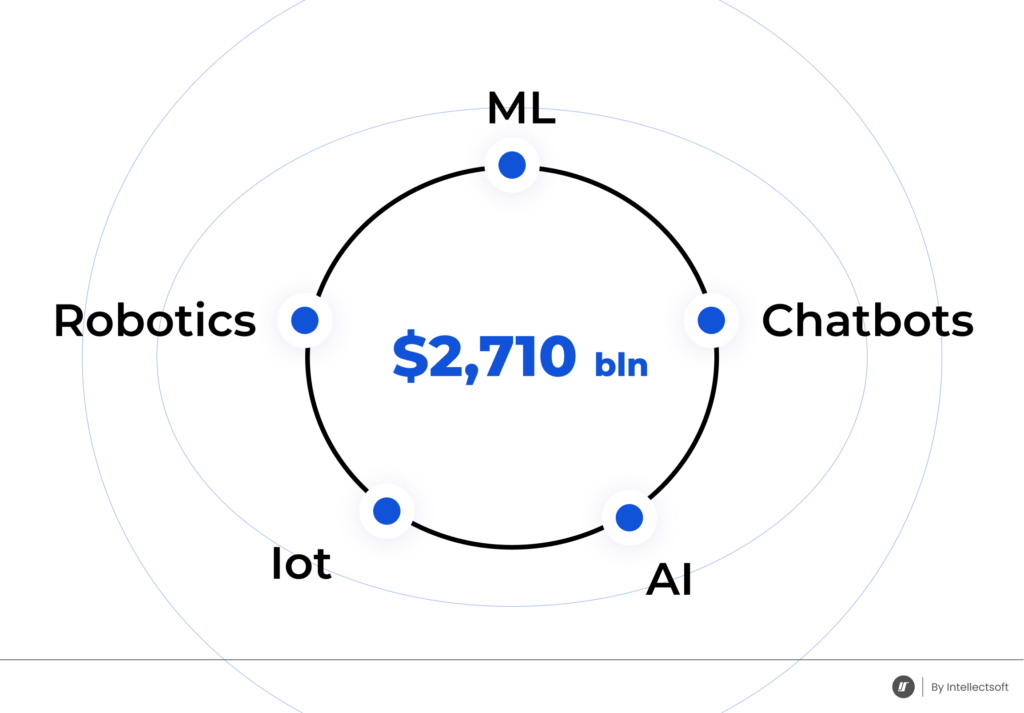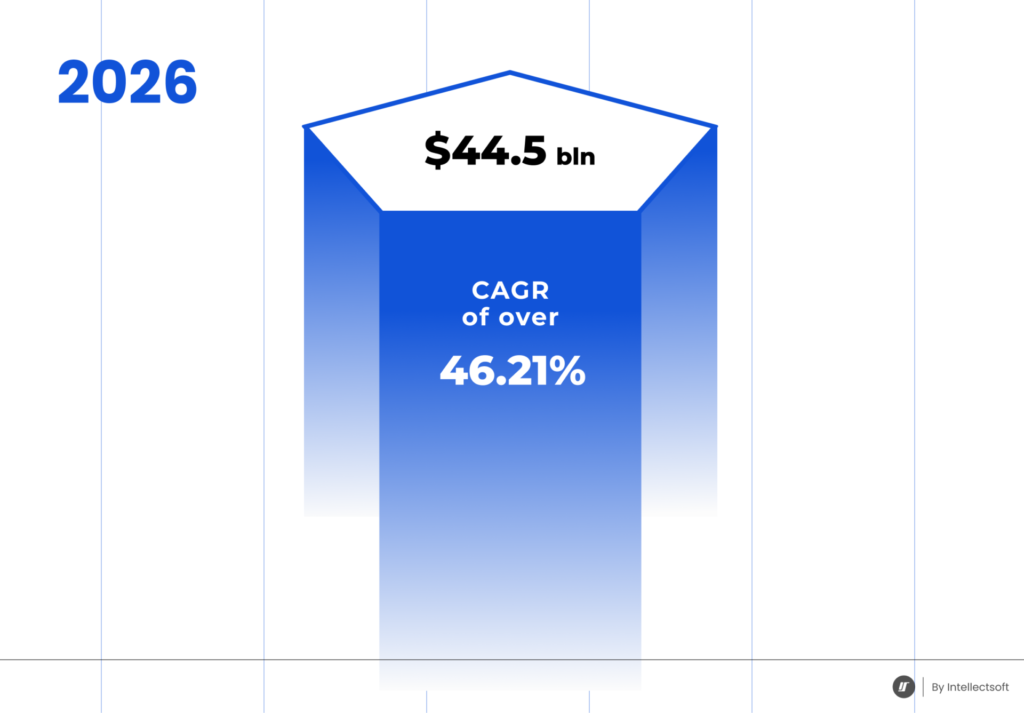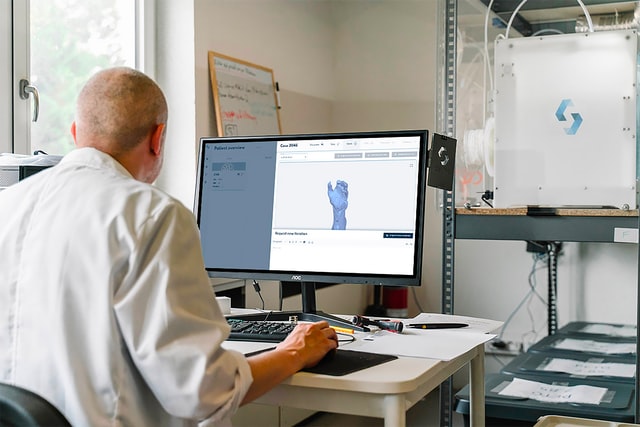Being one of the vitally important industries, healthcare has already become the top revenue earner for multiple leading countries across the globe.
In the United States alone, the estimated industry revenue for 2021 has reached almost $2,710 billion, according to Statista, and these numbers will only increase in the upcoming years with the wider use of technology-enabled solutions such as medical chatbots, AI, robotics, IoT and of course, machine learning algorithms – the last one has made a huge contribution into the “smart” healthcare development.

In this article, we’ll demonstrate the major machine learning use cases in healthcare, as well as introduce the benefits of its implementation and the future trends of ML technology development for the healthcare industry.
As a part of our discussion, you’ll be able to learn the central challenges of machine learning and, finally, uncover how to successfully develop the software solution exactly for your business goals and needs.
Major Benefits of Machine Learning in Healthcare
At present, implementing various innovative technological solutions in the healthcare industry has already become a common practice.
We can now use machine learning algorithms for new drug discovery and advanced research, provide an effective, highly personalized treatment, achieve better imaging and diagnostics, detect and prevent diseases in the early stages, improve patient engagement, and many more.
And those are no longer the future but already a fact: Google has rolled out the ML algorithm that identifies cancer in mammograms, while Stanford University scientists use deep learning to detect various forms of skin cancer.
These are only a few of thousands of brilliant examples of machine learning in healthcare. With this said, let’s now analyze the narrow scopes of successful ML usage: from the disease diagnosis and treatment to its prediction and prevention.
Diagnosis and Disease Detection
The most effective area of use of machine learning in healthcare is disease identification and accurate diagnosis. The thing is that some specific diseases, such as different types of cancer or genetic diseases are very hard to detect, especially in their initial stages.
The machine learning algorithms, however, can identify those based on the information and other specific characteristics known, yet provide detailed recommendations of the possible treatment strategy in clinical conditions.
EHR Storage and Management
Along with the advanced machine learning technologies implemented, there is still a significant problem with effectively keeping the patient health records, as it requires a lot of time and effort to fill in all the records and track the changes. However, these processes can be optimized with the use of vector machines and ML-based OCR recognition techniques.
For instance, the Medical Vision from Google helps to access the relevant disease information based on the image analysis, which works perfectly for various skin diseases. Or else, with the machine learning algorithms from MathWorks, it becomes much easier to digitalize handwritten medical records with specific recognition technology.
Diabetes Prediction
According to the latest data from International Diabetes Federation, the total number of people aged 20-79 years living with diabetes is approximately 537 million as of 2021, and this number is projected to rise to 643 million by 2030 and 783 million by 2045 – in overall, that’s a 45% increase!
However, knowing that diabetes mostly damages the kidneys, the heart, and nerves, it’s possible not only to diagnose this dangerous disease but predict and prevent its occurrence.
As an example, outstanding classification technologies like the Naive Bayes Algorithm, Decision Tree, and SVM employ a set of various machine learning algorithms for detecting diabetes resulting in a positive or negative prediction.
Liver Disease Analysis and Prediction
Another important aspect of using machine learning algorithms in healthcare refers to the early prognosis of various liver diseases. Being one of the most essential organs for metabolism, the liver is also highly vulnerable to serious illnesses like chronic hepatitis, liver cancer, cirrhosis, and many more – all these diseases are extremely hard to predict.
Nevertheless, after the implementation of machine learning in healthcare industry, this process has undergone a significant shift: now the ML classification and clustering algorithms can effectively predict liver disease using enormous amounts of medical data.

Advanced Treatment Personalization & Behavioral Adjustments
The most prominent machine learning use cases in healthcare refer to building up a more effective treatment plan based on the EHI records for each patient individually.
So, the patient receives a personalized treatment strategy based on his specific health characteristics, gets recommendations about the most effective drugs and accompanying procedures that can enhance the recovery process, and finishes the treatment in shorter time frames.
Additionally, machine learning algorithms are now widely used to change the common behavioral routines and unconscious activities of any person, which can be dangerous from the long-term perspective and result in serious diseases such as, for example, cancer or diabetes.
Dealing With COVID-19 Infections
The last but not less important scope of using machine learning in healthcare is its employment for learning and fighting COVID-19. According to PubMed, scientists and researchers are now developing ML technology for 2 major applications:
- Diagnosing the COVID-19 disease;
- Predicting the mortality and severity of this infection based on the detailed analysis of the patients' age, LDH, CRP, Oxygen Saturation, Lymphocyte, Comorbidities, and many other factors.
The core datasets for the machine learning implementation consist of the most reliable yet accurate data: clinical and laboratory records. As a result, this ML tech solution is aimed to enhance the worldwide efforts to control and manage the virus, and hopefully can help to curb it completely.
What’s the Future of Using Machine Learning in Healthcare?
Human life is the most valuable thing to care about, so advanced technologies like machine learning without a shadow of a doubt will only gain popularity in the future.
The powerful ML algorithms have already learned how to track and analyze health information and various patient indicators, deliver tons of helpful data for doctors, assist in composing an effective treatment plan and the best care as the outcome.
Moreover, the market size of healthcare artificial intelligence solutions during the period 2020-2026 will grow at a CAGR of over 46.21% and is estimated to reach revenues of $44.5 billion by 2026, according to Bloomberg. Such a tremendous demand for AI solutions means there has never been a better time to enter the healthcare technology market and get on top of the competition within a specific niche.

5 Best Examples of Machine Learning in Healthcare
If you’re curious about the practical examples of how is machine learning used in healthcare today, the best way to enhance your expertise is to analyze the most successful ML projects within the scope. Below you’ll find the list of feature-rich tech solutions for medical scope developed by the world’s largest tech giants and those created in startups as well.
#1 IBM Watson Genomics
Being one of the most outstanding cases of implementing machine learning in healthcare projects, this project is now successfully used for effective disease diagnostics and treatment. It employs cognitive computing solutions with genome-based tumor sequencing and speeds up the diagnosis process.
#2 PReDicT Project
Predicting Response to Depression Treatment project is a novel medical device aimed at enhancing the treatment and management of depression in clinical practice through creating personalized treatment approaches for patients.
According to recent studies, depressed patients often do not respond to the first antidepressant prescribed, resulting in sequential trials of different medications. However, the predictive machine learning algorithms can assist in guiding the antidepressant treatment based on the results of behavioral tests of affective cognition and subjective symptoms the patients have.
#3 Cloud Vision API
Designed by Google, this application enables providing the relevant information based on the image input. It is available for both mobile and web users and can be utilized by both healthcare workers and people that have no expertise in medicine.
The 5 features of Medical Vision are object detection, web detection, object labeling, safe search, and image properties, and they help to access the most relevant information the user searches for based on the detailed image analysis.
#4 SafeBeing App by Somatix
This project is aimed to track and change the common behavioral habits of a patient such as physical activities, hydration, medication intake, sleeping, heart rate, pressure sore risk, and many others that can impact the person’s health and overall well-being using a simple wearable device on a hand.
The algorithms passively collect the data 24/7 and analyze it to identify alerts, insights, and reminders that are relevant exactly for the certain patient. With this essential data, users can get various health details that can benefit the treatment process and help to maintain a healthy lifestyle as well.

#5 Project Hanover by Microsoft
Focused on technology precision medicine development, this technology empowers medical workforces to comb through the thousands of documents published each day in the biomedical literature, flag and rank all the sources that are potentially relevant to researchers, such as, for instance, information on the gene, mutation, drug, and patient response.
This project was originally designed for oncology researchers that need to deeply study and interpret cancer-related information fast and efficiently.
For serious diseases like cancer treatment, where thousands of new researches are published every day, such a machine can become one of the most critical game-changers: it can scan all the latest resources and help cancer specialists to answer specific questions.
Though these machine learning algorithms in healthcare are still in the early stages of their development, it is expected that Project Hanover can be similarly utilized for the other medical fields that work with big data.
The Biggest Challenges of Machine Learning in the Medical Industry
Once you’ve learned the main benefits of machine learning in healthcare, it’s time to consider the challenges you and your team may face when working on the ML project for your business.
Data Security
Overall, the medical records still represent the patient information, which is personal and forbidden for access. Moreover, some laws and regulations in healthcare, such as HIPAA or GDPR, require EHI encryption to ensure the data won’t be accessed by third parties.
Algorithms Transparency
Transparent algorithms are not solely required to meet all the drug development regulations. Apart from that, it should also provide a clear understanding of the analysis conducted by machine learning algorithms.
EHR Optimization
According to the American Hospital Association (AHA), nearly 93% of hospitals have already implemented the EHR into their workflow in the US, but worldwide statistics are still far from ideal.
For instance, in the developing countries that are developing, these practices are still in the early stages of implementation, which makes the ML technologies helpless. That is why focusing on the EHR system is simply a necessity.
Long-Term Data Analysis
Machine learning technology is in the early stages of growth too. So, even if implemented properly, it still lacks value from the long-term perspective, as the specific health indicators and patient diseases tracked today using machine learning in healthcare can barely reach 5 years of time.
Of course, with the algorithm's updates and improvements, this situation will change for the better, but at present, the data used by ML is still not enough for a deeper analysis and use.
Lack of Expertise
Finally, not all developers possess enough expertise to create and implement the perfect ML solution, and even fewer of them can adapt it specifically for the healthcare and pharmaceutical industries.
Wrapping Up
To sum up, machine learning refers to the most significant yet popular technologies that are widely incorporated into the various healthcare IT solutions and software services. Learning the basic machine learning use cases in healthcare allows you to better understand its potential, uncover its major benefits and get the valuable source of features to include in your upcoming business project.

If you’re looking for a professional team of software developers, Intellectsoft’s crew is always here to assist. With vast experience in creating top-notch software solutions for healthcare, our developers can always keep you in the loop regarding the latest trends in medical scope, as well as can help you to pick up the most effective functionalities that perfectly fit your project requirements and business goals, yet employs the innovative approaches of the machine learning technologies.
Here, at Intellectsoft, we are constantly in search of the latest innovations and advanced tech solutions in healthcare for our clients to take their organizations to a completely new level of development. Are you ready to implement the changes into your business?
Talk to our experts to uncover how to effectively implement machine learning technologies into your healthcare organization and start benefiting from it today!
